It’s to do with the state treasury refusing to pay overtime. Performances have been called off in Kuopio (Finland), Granada and Badajoz.
Click here for story (in Spanish).
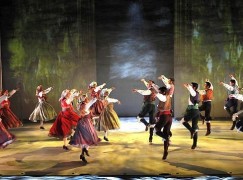
It’s to do with the state treasury refusing to pay overtime. Performances have been called off in Kuopio (Finland), Granada and Badajoz.
Click here for story (in Spanish).

This just in from Ed Henderson in Vancouver.

AFM in NYC fines the entire Vancouver Executive Board 50K each
A letter from the New York based head office of the American Federation of Musicians (AFM) arrived today. The postmark said it was sent two weeks ago. The International Executive Board (IEB) of the AFM charges me and eight other former board members (and one staff member) of the Vancouver Musicians Association (VMA), with a bylaw infraction. In two weeks we are to defend ourselves before the same IEB that is charging us, the same IEB will pass judgment upon us and, as the letter states, the same IEB promises the most extreme punishment possible: expulsion from the AFM (meaning no chance to work again on any AFM gigs: Symphony, CBC, Opera, Chilliwack band, record sessions, solo concerts, theatres across the country etc… – all of which have been my livelihood for the last 40 years) and a $50,000.00 fine for each of us. They will win (how could they lose in their own court?) and they see that as an easy 500K, which they desperately need.
Prosecutor, judge, jury, deliverer of punishments and collector of fines all in one body based in New York – a body that maintains full control of the Canadian Federation of Musicians offices and claims ownership of all Canadian locals. And they get most of our dues too.
Why are they so vicious? That Vancouver had the audacity to negotiate a contract. A contract based on an already existing Canadian film and TV contract, which had been in constant use for twenty years. The new members of the IEB want nobody to use the Canadian contract and added restrictions to it making it unusable. We negotiated a contract to replace what the IEB denied us and as a result: VMA trusteeship.
The VMA has been in trusteeship for almost one year. In the six months prior to the trusteeship VMA members working in film earned a combined total of about 175K – six months after… zero, nada, ziltch. It’s now just shy of one year and still… zero, nada, ziltch. The IEB granted itself its wish: that there be no union film work in BC.
Film is a serious industry in BC (around 1.5 billion a year) yet local musicians, prior to the trusteeship, accounted for less than 2 cents of every $1,000.00 spent on film in BC. With such wonderful musical talent in BC does this make any sense? Not to me but, the AFM told us they’d rather we worked non-union – to quote their lawyer speaking last month in the BC Supreme Court.
The AFM has gone from 300,000 members in the 1980’s to around 70,000 today (a greater proportion of those losses occurring in the USA). Could this be because of actions such as those current against Vancouver? Perhaps there are other reasons too. I don’t know a film producer today who will sign an AFM contract – I used to know some but now they all refuse to put their names on an AFM document and that is a shame for all Canadian musicians.
And, all I can say is Oh, Canada – my home and native land! I want my CFM back in control of Canadians who are interested in Canadian concerns and not in pleasing the IEB. As I said, the IEB will win in their court and see it as an easy 500K. I see this as the end of the AFM for which, all musicians will lose.
UPDATE: Ed adds on his FB page: Dues from Canada go to New York and they pay the staff and expenses of the Canadian office (and NY rules the CFM staff as well). Canada is the only country in the world with a musicians association controlled by people in another country – that is crazy. If I had known that when I joined, in 1973, I would not have joined.
Scientists at the University of Eastern Finland have come up with an alarming hypothesis: those with the highest level of cynical distrust have higher risk of dementia than those who tend to accept things on trust. At least among elderly Finns (pictured).
Musicians, beware.
Research summary here.

Social media are abuzz with our news of the London Symphony Orchestra’s appointment of an 18 year-old co-principal trombone.
He’s the youngest principal in LSO history, that’s for sure. But there must have been some younger players in the ranks.
Neville Marriner, 90 last month, was playing in the LSO second violins at 15 in 1939 when senior players were called up to war. And there must have been more his age in other combatant countries.
So who was the youngest player ever to have won an appointment in a major orchestra?
Nominations, please.

UPDATE: The ball has started rolling.
Barry Tuckwell, principal 3rd horn with Melbourne Symphony at age 15 (h/t: Kylie Long)
Gregor Piatigorsky, at 15, was principal cellist in the Bolshoi Theatre orchestra.
Raymond Cohen, a violinist of 15, was the youngest ever to join the Halle Orchestra.
Oboist Leon Goossens joined Henry Wood’s Queens Hall Orch at 15, according to Wiki; some say 17.
Szymon Goldberg became concertmaster of the Dresden Philharmonic at 16 and of the Berlin Philharmonic three years later.
Peter Steiner, a 48-year vet in the Berlin Philharmonic, started at 16 in 1944 as a cellist at the Deutsch Oper.
Stanley Drucker, clarinet, entered the the Indiannapolis Orch at 16 and the New York Phil at 19 (H/t Andrew Condon).
Arthur Isadore Berv, horn, joined the Philadelphia Orchestra in 1923, when he was 17.
Bart Claessens joined RCO as 2nd trombone/basstrombone at the age of 17. (h/t: Harry Boom)
Michael Thompson was appointed Principal Horn of the BBC Scottish SO when he was 18 (h/t Anthony Kershaw).
Lynn Harrell and Josh Smith joined the Cleveland Orch at 19 (h/t Jeffrey Levenson)
Gunther Schuller was 17 when he was named principal horn with the Cincinnati Symphony Orchestra (1943–5). Before that he played two years with American Ballet Theater. (h/t: Harold Braun)
Emmanuel Pahud was 18 when he was named principal flute ay Basle Radio Symphony.
Arnold Rosé was 17 when he took the concertmaster’s seat at the Vienna Opera in 1881.
Mark Abbott was named assistant principal horn in the Detroit Symphony Orchestra at age 18. (h/t: Mark Stryer)
Charles Treger, according to a 1976 newspaper report, joined the Detroit Symphony violins at age 15, which puts him in the lead.
Venezuelan double-bassist Edicson Ruiz entered the Berlin Philharmonic when he was 17, the second youngest player in its history. He had to wait three years for tenure.
The youngest Berlin Phil player was a harpist, back in the 19th century.
Conductor Ward Stare started out as principal trombone of Lyric Opera of Chicago, aged 18. (h/t: Holly Mulcahy)
Michal Winfield may have become principal oboe of the Halle at 16 (awaiting confirmation)
Lawrence Leonard joined the LSO in 1939 as a cellist. He was 16.
Roger Voisin became assistant principal trumpet of the Boston Symphony Orchestra at 17 in 1935; he became #1 trumpet in 1950.
Paul Renzi became principal flute with the San Francisco Symphony in 1944 at age 18.
Manuel Huber, horn, joined the Vienna Opera orchestra at 20. He remains the youngest member of the Vienna Philharmonic.
Keep ’em coming…
Message from the Chicago Symphony Orchestra:
Frank [Villella, CSO archivist] said you had a query. According to Frank, on our current roster, bass Mark Kramer was 19 when he was hired in 1974, and clarinet John Bruce Yeh was 20 when he was hired in 1977.
Adds Frank, “But since we don’t have birth records for all of our members (particularly from the earliest part of our history), it’s impossible to ever definitively say who was the youngest.”
The festival has just posted a short video, explaining the reasons behind its contentious costume decisions in an opera where a blameless young singer, Tara Erraught, was derided for her size.
Octavian in a frumpy dressing-gown is not a pretty sight. That does not excuse the fat-fest, but clearly the outfit did not help.
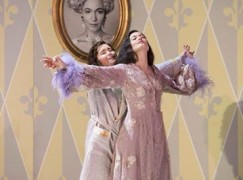
London’s South Bank Centre has come up with a new £24 million scheme to ‘maintain’ the grotty parts of the site, after Mayor Boris Johnson shot down its £120 million Festival Wing.
Two-thirds of the new money is coming from the Arts Council – without public debate, as usual. This is a patchwork solution, more money down the drain and no clear strategy while a failing management pushes paper rounds its desks.
The South Bank needs new leadership. Also a new constitution. Press release follows.

SOUTHBANK CENTRE ANNOUNCES CONSERVATION PROJECT FOR QUEEN ELIZABETH HALL AND HAYWARD GALLERY FOLLOWING ARTS COUNCIL ENGLAND GRANT
Arts Council England is to fund the repair and maintenance of Southbank Centre’s Queen Elizabeth Hall, Purcell Room and Hayward Gallery with a £16.7m grant. Starting in late 2015, the building conservation project will address a £24m backlog of repairs. The Arts Council grant will meet 70% of the budget, with the remainder to be raised from trusts, philanthropists and audiences.
Southbank Centre is still working to resolve the funding of a wider scheme for the Festival Wing, which will deliver new space for art and culture, alongside major public realm and service improvements. It expects to make recommendations on this scheme in late 2014.
Rick Haythornthwaite, Chairman of Southbank Centre, said: “We are very grateful to Arts Council England for so generously supporting the urgent repair and maintenance of these iconic 60s buildings. This is an important step for Southbank Centre following the delay to our Festival Wing scheme in February.
“We still aim to create new space for our artistic and cultural programmes, once we have found a way through the substantial remaining funding challenge. This will enable us to meet the huge demand for our work following the refurbishment of Royal Festival Hall.”
Alan Davey, Chief Executive of Arts Council England said: “The Arts Council is pleased to be able to safeguard the future of this vital part of London’s artistic and tourist infrastructure through this capital grant. This grant will enable the Southbank to carry out essential work to enhance its existing space, giving them the right buildings to deliver their fantastic artistic and cultural programme and to bring multiple benefits to the millions of visitors the centre attracts each year.”
Simon Hickman, Inspector of Historic Buildings and Areas at English Heritage, said: “These uncompromising brutalist buildings reflect radical changes in British society and culture during the era of their design and creation. Their conservation could not be further delayed and we are delighted that Southbank Centre and Arts Council England are prepared to invest in them. This will enable the public to appreciate the buildings and their significance. English Heritage looks forward to working with Southbank Centre and sharing our expertise in the detailed development of the proposal.”
The new building conservation project will improve essential services, environmental performance, infrastructure such as workshops and backstage areas, and disabled access for audiences and artists. It will restore the buildings’ interiors to their original appearance and repair exterior terraces to maintain a key part of the site’s outdoor landscape. It will also replicate the iconic Hayward Gallery Pyramid Roof to allow controlled natural light into the galleries as originally conceived.
The project will include an extensive, permanent programme of learning and participation. This will allow people of all ages and backgrounds to engage with the history of these important buildings, helping to change attitudes to 20th century architecture.
Southbank Centre continues to work on its Festival Wing plans with neighbours including the BFI and National Theatre, the GLA and Lambeth Council. It will be making every effort with skateboard groups to resolve their future in the Queen Elizabeth Hall undercroft, which is the subject of ongoing legal challenge.
Patrizia, Simon und Helen, aged 11 and 12, take on Leonard Cohen’s torch song in a German talent contest.
Impeccable close harmony, unflappable with tricky lyrics.
Simply irresistible.

Always an orch with an eye to the future, the LondonSymphony Orchestra has just named Peter Moore, 18, as co-principal trombone. He is a former winner of BBC Musician of the Year. He’ll have plenty of wise heads around to chaperone him.
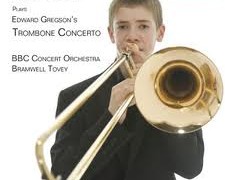
(UPDATE: But is he the youngest player in any major orch? Click here for answers.)
LONDON SYMPHONY ORCHESTRA APPOINTS ITS YOUNGEST EVER MEMBER, 18-YEAR-OLD PETER MOORE, AS CO-PRINCIPAL TROMBONE
The London Symphony Orchestra has appointed 18-year-old Peter Moore as Co-Principal Trombone, the Orchestra’s youngest ever member. Peter was a graduate of the 2012 LSO Brass Academy. Each year the LSO Academy provides up to 30 promising young instrumentalists aged 14–24 with a unique opportunity to work with the great orchestral musicians of their time in a week of orchestral-focused workshops and masterclasses at LSO St Luke’s. Peter Moore’s appointment makes him one of nine members of the LSO who have come through the LSO Academy and other artist development schemes run by the Orchestra.
The LSO’s Artist Development programme identifies and nurtures the next generation of young performers, composers and conductors from a diverse range of backgrounds, and offers them opportunities to develop their careers. Over the past three years, over one thousand performers aged 14 to 35 have worked directly with LSO players as part of the programme; for many, this has offered a pathway into the professional music world. Alongside Peter Moore, Angela Barnes (Horn), Antoine Bedewi (Co-Principal Timpani), Philip Cobb (Principal Trumpet), Naoko Keatley (Second Violin), Maxine Kwok-Adams (First Violin), Joseph Melvin (Double Bass), William Melvin (Second Violin) and Sarah Quinn (Sub-Principal Second Violin) have all graduated from either the LSO Academy, or taken part in the LSO String Experience, and progressed to become members of the LSO.
As part of the collaboration between the LSO and the Guildhall School of Music & Drama, a new postgraduate specialism in Orchestral Artistry was launched in September 2013.
***
In 2008, at the age of 12, Peter Moore became the youngest ever winner of the BBC Young Musician of the Year competition. He studied with Philip Goodwin at Chetham’s School of Music in Manchester, and with Ian Bousfield (previously Principal Trombone of the LSO and now Principal Trombone of the Vienna Philharmonic Orchestra).
Following his Wigmore Hall debut in 2008 Peter has given recitals at venues and festivals throughout the UK including The Bridgewater Hall, St George’s Bristol, Conway Hall, Eaton Square, Royal Welsh College of Music & Drama, Leeds College of Music, and the Newbury, Chester and Manchester Festivals. As a concerto soloist he has appeared with the Polish Chamber Orchestra (both in Poland and at the Rheingau and Mecklenburg-Vorpommern Festivals), the Northern Chamber Orchestra, Brighton Philharmonic and BBC National Orchestra of Wales.
In 2009 Peter featured as soloist at the European trombone festival The Slide Factory in Rotterdam and undertook a five-week tour of Australia. He has since returned twice to Australia and New Zealand for extensive trips performing as soloist with orchestras, bands and in recital.
Peter’s debut CD recording of Edward Gregson’s Trombone Concerto with the BBC Concert Orchestra was released in 2010 to critical acclaim, and a recording with the Australian Brass Group Brass FX will be released shortly.
In January 2013 Peter won the Wind section of the Royal Over-Seas League Competition and in October featured as soloist in the opening concert of the brass event performing Mark-Anthony Turnage’s trombone concerto Yet Another Set To with the BBC National Orchestra of Wales.
The death of David Nadien, a revered performer and sometime concertmaster of the New York Philharmronic, has revived old rumours that his career, along with several others, was ruined by the machinations of America’s master-violinist Isaac Stern.
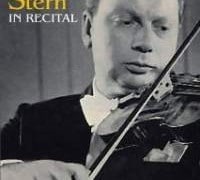
Other supposed victims include Oscar Shumsky, Aaron Rosand, Eugene Fodor, Michael Rabin…. anyone, in short, who failed to match Stern’s supreme American fame.
Now Isaac was influential, no question about that. He single-handedly drove the campaign to save Carnegie Hall from the wrecker’s ball and he advanced any number of string talents through ICM Artists, which was run by his former secretary, Lee Lamont. He had first reports on new talent at Juilliard from his friend Dorothy DeLay, the strings queen. He was close to Leonard Bernstein. He was in a position to help others, but that does not mean he could also harm.
I looked into all of this when researching my book, When the Music Stops (published in the US as Who Killed Classical Music?), and found no trace of any kind of godfather mania on Isaac’s part. He wielded influence, and gave money, on behalf of those he believed in. That’s about it.
There was no way he could have killed a career. ICM represented a lot of instrumentalists but it was a boutique on the US concert scene beside the supermarket that was Ronald Wilford’s CAMI. Neither had absolute power to make or break. Promoters and orchestras unhappy with one agency could always turn to the other. America was, and remains, an open market.
Yet the gossip persists that Isaac Stern fixed a few careers. A well-connected observer told me today it’s what ‘everyone says’.
I believe it is untrue. In the absence of any objective evidence, it’s time to lay the slurs against Isaac Stern to rest.
The week’s US sales are in on Nielsen Soundscan and all of Sony’s marketing men could not push Dutch child-star Amira Willighagen to number one.
Amira’s release sold all of 410 copies, beaten to the top spot by a live recording of West Side Story from the San Francisco Symphony.
Meanwhile, Jackie Evancho was making tears flow on Memorial Day. She’s feeling no pressure.

Gabi Holzwarth, 24, dropped out of a dull job and went busking on the streets of Palo Alto, California.
Today, she’s playing solo gigs for the moguls of hi-tech. She has played for BitTorrent, NetApp, Samsung, LinkedIn and Google, once even forming a duet with Snoop Dogg. She now has a mogul boyfriend.
Word is, she could be the next Lindsay Stirling. How did that happen?
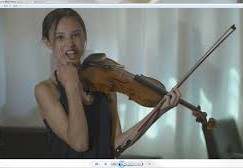
Gabi’s story: When I first began busking, I performed a list of classical pieces with my violin alone. This became repetitive, so I had the idea to begin playing along to different genres of popular music. I went to Guitar Center, told them my idea, and asked them “What equipment do I need to make this happen?” An hour later I departed the store with an amplifier and a pickup, and I was ready to go. The next day, I brought this to the streets. People loved it, and managers asked me to plug in front of their stores in order to draw people in. People stared at me with a look of both surprise and joy, often letting me know “I have never seen anything like this! But why are you on the streets?!” “You’ve gotta start somewhere!” was always my response.
I ran into one interesting situation at Trader Joe’s, in which a “No Soliciting” sign was put right in front of me urging people to “ignore the solicitor”. But the masses always win – I continued to play and my loyal fans petitioned the manager to move the sign. Things took off from here, and soon I was asked to perform for private events all over the bay area. In just 6 months, my schedule is now packed as I perform at both private and public events throughout the bay area in homes, restaurants, clubs, museums such as the deYoung, and even tech companies like Google, NetApp, Synopsys, LinkedIn, BitTorrent, GigaOm, and Uber! It has been a whirlwind 6 month start to my career and I am so excited to see how far I can take this!
The Canadian soprano Joyce El-Khouri and American tenor Michael Fabbiano have issued an urgent appeal on behalf of Jonathan Sataloff, 22 years old, who needs a bone-marrow transplant in Philadelphia. Please watch and help if you can. You can register, apparently, anywhere in the world.
